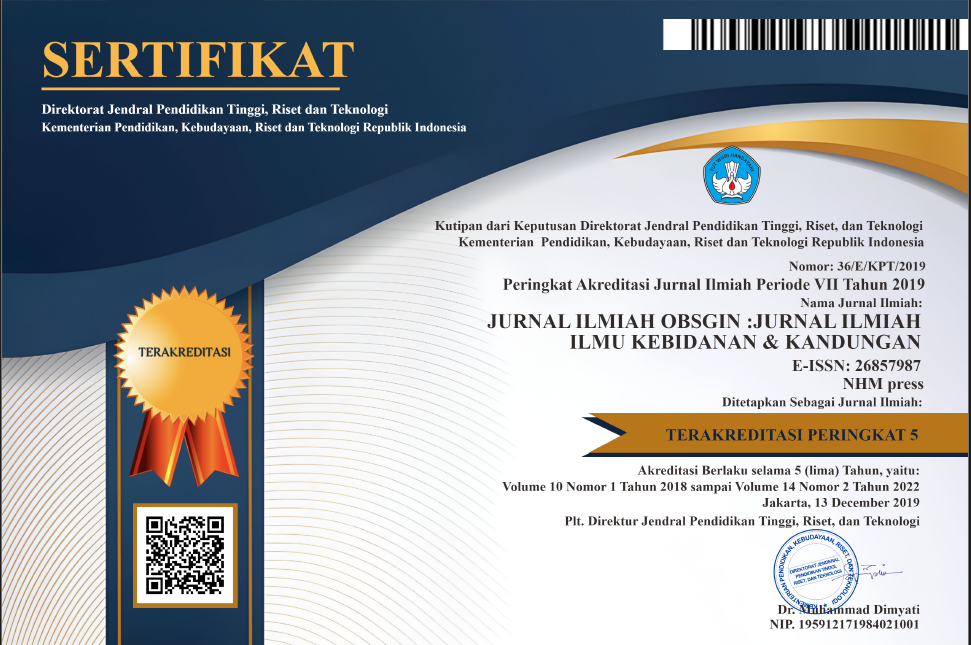PENGGUNAAN KALPIN TERHADAP PENINGKATAN PENGETAHUAN TENTANG DIET DAN ASUPAN MAKANAN PENDERITA DIABETES MELITUS
Abstract
DM disease greatly affects the quality of human resources and has an impact on increasing health costs which are quite large. Many people do not realize the importance of controlling blood sugar levels in diabetics are not even aware that they have diabetes, and realize after the occurrence of complications of the disease themselves. The purpose of this study was to determine the effect of using a smart calendar on increasing the knowledge of DM patients at the Penyengat Olak Health Center, Muaro Jambi Regency.
The design used was a case-control with a quasi-experimental design, using a pretest-posttest approach with a control group, with a total sample of 30 which was divided into 15 intervention groups and 15 control groups. Data analysis used t-test and independent t-test.
Statistical analysis found that there was an effect of smart calendars with knowledge about diet and food intake management in DM patients, with a p-value of 0.004, so it was concluded that the use of SMART CALENDAR as a reminder medium for sufferers could increase their knowledge, improve their discipline to manage food so that in the end is expected to reduce blood sugar levels of respondents before and after the intervention. By comparing the control group, p.value = 0.011, it can be concluded that there is a significant difference in the average group of respondents who use the SMART CALENDAR and those who do not use the SMART CALENDAR.
In conclusion, the use of a PINTAR CALENDER can help increase knowledge about diet and food management but must be accompanied by the supervision of officers or families.
References
Ambarwati, W. N. (2012). Konseling pencegahan dan penatalaksanaan penderita diabetes mellitus. Prosiding Seminar Nasional Keperawatan.
American Diabetes Association. (2018). Classification and diagnosis of diabetes: Standards of medical care in Diabetes 2018. Diabetes Care, 14(1), S13–27.
Astari, R. (2016). Hubungan antara kepatuhan terapi diet dan kadar gula darah puasa pada penderita diabetes melitus tipe 2 di wilayah kerja puskesmas purnama pontianak. Jurnal Mahasiswa PSPD FK Universitas Tanjungpura, 5(1).
Bertalina, B., & Purnama, P. (2016). Hubungan lama sakit, pengetahuan, motivasi pasien dan dukungan keluarga dengan kepatuhan diet pasien Diabetes Mellitus. Jurnal Kesehatan, 7(2), 329–340.
Bistara, D. N., & Ainiyah, N. (2017). Hubungan pengetahuan dengan kepatuhan diet pada penderita diabetes mellitus di posyandu lansia cempaka kelurahan tembok dukuh Kecamatan Bubutan Surabaya. Journal of Health Sciences, 11(1), 51–57.
Data, P. (2014). Informasi Kementerian Kesehatan RI (INFODATIN).(2014). Situasi Dan Analisis Diabetes. Kementrian Kesehatan RI Tahun.
Dinkes Kota Jambi. (2020). Profil Kesehatan Kota Jambi. http://dinkes.jambiprov.go.id/all_profil_kesehatan
Endrawati, N. R. L. (2020). Hubungan Diabetes Self Management Education Dengan Status Gizi Pada Penderita Diabetes Melitus Tipe 2 di RT 001-004 Desa Mlideg Kedungadem Bojonegoro. STIKes Insan Cendekia Medika Jombang.
Frisca, S., Daeli, F. F., & Wibowo, A. A. (2019). Pendampingan dalam peningkatan perilaku hidup sehat peduli Diabetes Mellitus tipe II dan pencegahan luka kaki Diabetes di Palembang. Journal of Character Education Society, 2(1), 12–18.
Indonesia, P. E. (2015). Pengelolaan dan pencegahan diabetes melitus tipe 2 di Indonesia. Pb. Perkeni.
Kartini, T. D., Amir, A., & Sabir, M. (2018). Kepatuhan Diet Pasien DM Berdasarkan Tingkat Pengetahuan dan Dukungan Keluarga Di Wilayah Puskesmas Sudiang Raya. Media Gizi Pangan, 25(1), 55–63.
Kemenkes RI. (2018). Hasil utama RISKESDAS 2018. In Kementerian Kesehatan Badan Penelitian dan Pengembangan Kesehatan. https://kesmas.kemkes.go.id/assets/upload/dir_519d41d8cd98f00/files/Hasil-riskesdas-2018_1274.pdf
L.J.Raffel, M. O. G. (2014). Diabetes Mellitus. In Reference Module in Biomedical Sciences. https://doi.org/https://doi.org/10.1016/B978-0-12-801238-3.05558-6
Parveen, N., Roy, A., & Prasad, P. (2017). Diabetes Mellitus–pathophysiology & herbal management. … and Biosciences Journal. http://www.ijpsnonline.com/index.php/ukjpb/article/view/2001
Phitri, H. E. (2013). Hubungan Antara Pengetahuan Dan sikap Penderita Diabetes Mellitus Dengan Kepatuhan Diet Diabetes Mellitus Di RSUD AM. Parikesit Kalimantan Timur. Jurnal Keperawatan Medikal Bedah, 1(1).
Risti, K. N., & Isnaeni, F. N. (2017). Hubungan Motivasi Diri dan Pengetahuan Gizi terhadap Kepatuhan Diet DM pada Pasien Diabetes Mellitus Tipe II Rawat Jalan di RSUD Karanganyar. Jurnal Kesehatan, 10(2), 94–102.
Roden, M. (2016). Diabetes mellitus–definition, klassifikation und diagnose. Wiener Klinische Wochenschrift, 128(2), 37–40.
SARI, N., & Wahyuni, D. (2020). PENGARUH DIABETES SELF MANAGEMENT EDUCATION MELALUI MEDIA BUKU PINTAR TERHADAP KOMITMEN PERAWATAN DIRI PENDERITA DIABETES MELITUS TIPE II. Sriwijaya University.
Suciana, F., Daryani, D., Marwanti, M., & Arifianto, D. (2019). Penatalaksanaan 5 Pilar Pengendalian DM terhadap Kualitas Hidup Pasien DM tipe 2. Jurnal Ilmiah Permas: Jurnal Ilmiah STIKES Kendal, 9(4), 311–318.
Trisnawati, S. K., & Setyorogo, S. (2013). Faktor risiko Kejadian diabetes melitus tipe II di puskesmas kecamatan cengkareng Jakarta Barat Tahun 2012. Jurnal Ilmiah Kesehatan, 5(1), 6–11.
Tumiwa, F. A., & Langi, Y. A. (2010). Terapi gizi medis pada diabetes melitus. JURNAL BIOMEDIK: JBM, 2(2).
Wijaya, N. I. S. (2021). Hubungan Pengetahuan dengan Motivasi dalam Mencegah Terjadinya Komplikasi Diabetes Melitus di Wilayah Kerja Puskesmas Samata. Nursing Care and Health Technology Journal (NCHAT), 1(1).











